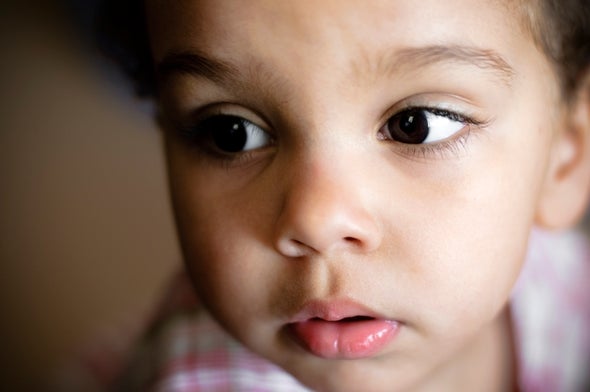(单词翻译:单击)
听力文本
This is Scientific American's 60-second Science, I'm Christine Herman.
Anyone who's ever been with a toddler can tell you: if they're upset about something, they will let you know.
(CLIP: Toddlers crying)
Scientists have been aware of this behavior, but what they did not know, until now, is that if babies as young as a year and a half old see someone else being treated unfairly, they expect the leader—the parent or caregiver—in that situation to step in and do something about it.
"Babies evaluate others constantly."
Renée Baillargeon is a psychologist at the University of Illinois. She led the research on babies expecting fairness.
"When these transgressions occur, babies evaluate parents and other leaders and say, 'Well, you saw this transgression. You know this is not fair. Are you going to do something about it?' And if you don't, then you are shirking your responsibilities, and it makes you less of a leader, less of a parent."
That's right, babies are judging you. Baillargeon says it seems babies are born with these expectations of what a leader is and how they should behave. The work is in the Proceedings of the National Academy of Sciences.

The researchers used bear puppets to perform skits for 17-month-old babies, who sat comfortably on a parent's lap.
In one scenario, the puppet leader intervenes when one of the other puppets hogs all the toys. In another, the leader does nothing to address the injustice. Baillargeon says such inaction that allows an unfair situation to persist bothers the babies, and they stare longer at that leader, as if waiting for him to act. In puppet scenarios when there was no clear leader, babies did not have this expectation of an intervention.
"It shows that they expect a leader to not just use power for his or her own self-interest but to use their authority to regulate the morality of their followers."
Alan Fiske, an anthropologist who studies human relationships at the University of California, Los Angeles. He was not involved in this study. He says many people underestimate what babies are capable of understanding and figuring out about the world, since they're just barely learning how to walk and talk.
"And so you might think they don't understand the world because, you know, they don't seem to be very competent at doing things in the world. But... amazing things are happening in their minds. They understand an enormous amount."
Baillargeon says the study supports the idea that babies have an innate understanding about power dynamics that then gets shaped by the culture they grow up in.
Maybe we should lower the voting age to 17 months?
Thanks for listening for Scientific American — 60-Second Science. I'm Christine Herman.
参考译文
这里是科学美国人——60秒科学系列,我是克里斯汀·赫尔曼。
任何与曾与幼儿相处过的人都知道:如果他们对某事感到生气,他们会让你知道。
(音频片段:宝宝的哭声)
科学家已经察觉到这种行为,但他们直到现在才知道,如果一岁半大的婴儿看到别人受到不公平对待,他们会期望在场的领导者——家长或监护人——介入并进行处理。
“婴儿经常评估他人。”
蕾妮·拜勒基安是伊利诺伊大学的心理学家。她领导了这项“婴儿期望公平”的研究。
“当这些违法行为发生时,婴儿会评估家长和其他领导者并说,‘你看到了这种违法行为。你知道这是不公平的行为。你要采取行动吗?’如果你什么都不做,那你就是在逃避责任,这会使你成为不称职的领导者和不称职的家长。”
没错,婴儿在评判你。拜勒基安表示,婴儿似乎天生具有“领导者是什么样的”以及“领导者应该怎样作为”这种期待。这项研究发表在《美国国家科学院院刊》上。
研究人员用小熊木偶为17个月大的婴儿表演滑稽短剧,这些婴儿舒服地坐在家长的腿上。
在一个场景中,当其中一个木偶霸占所有玩具时,木偶领导者介入。而在另一个场景中,领导者没有采取措施来处理这一不公平行为。拜勒基安说,这种不作为会让不公平情况持续存在,而这会让婴儿感到不安,他们盯着木偶领导者的时间会更长,好像在等待他们采取行动。在没有明确领导者的木偶剧场景中,婴儿没有这种干预期待。
“这表明,他们希望领导者不仅为自身利益而使用权力,还要为规范下属的道德行为而动用权威。”
艾伦·菲斯克是加州大学洛杉机分校研究人际关系的人类学家。他并未参与这项研究。他说,许多人因为婴儿刚刚学会走路和说话而低估了他们认识和理解世界的能力。
“所以你可能认为他们不了解这个世界,因为他们似乎在做事方面不太有能力。但是,他们的脑海中正在发生不可思议的事情。他们懂得很多。”
拜勒基安表示,该研究支持这样一种观点,即婴儿对权力动力学有着天生的理解,之后还会受到成长环境的影响。
也许我们应该把投票年龄降低到17个月?
谢谢大家收听科学美国人——60秒科学。我是克里斯汀·赫尔曼。
译文为可可英语翻译,未经授权请勿转载!
重点讲解
重点讲解:
1. be aware of 注意到的;察觉到的;意识到的;
We are aware of the potential problems and have taken every precaution.
我们已意识到潜在的问题,并采取了全面的预防措施。
2. step in 介入,干预,插手(棘手问题);
If no agreement was reached, the army would step in.
如果无法达成协议,军队将会介入。
3. be born with 生下来(有某种疾病或问题);天生(具有某种性格;
She was born with a healthy dose of self-confidence.
她天生就充满自信。
4. be capable of 有…能力的;能够…的;
The larger firm was capable of providing a better range of services.
较大的公司能够提供一系列更好的服务。


